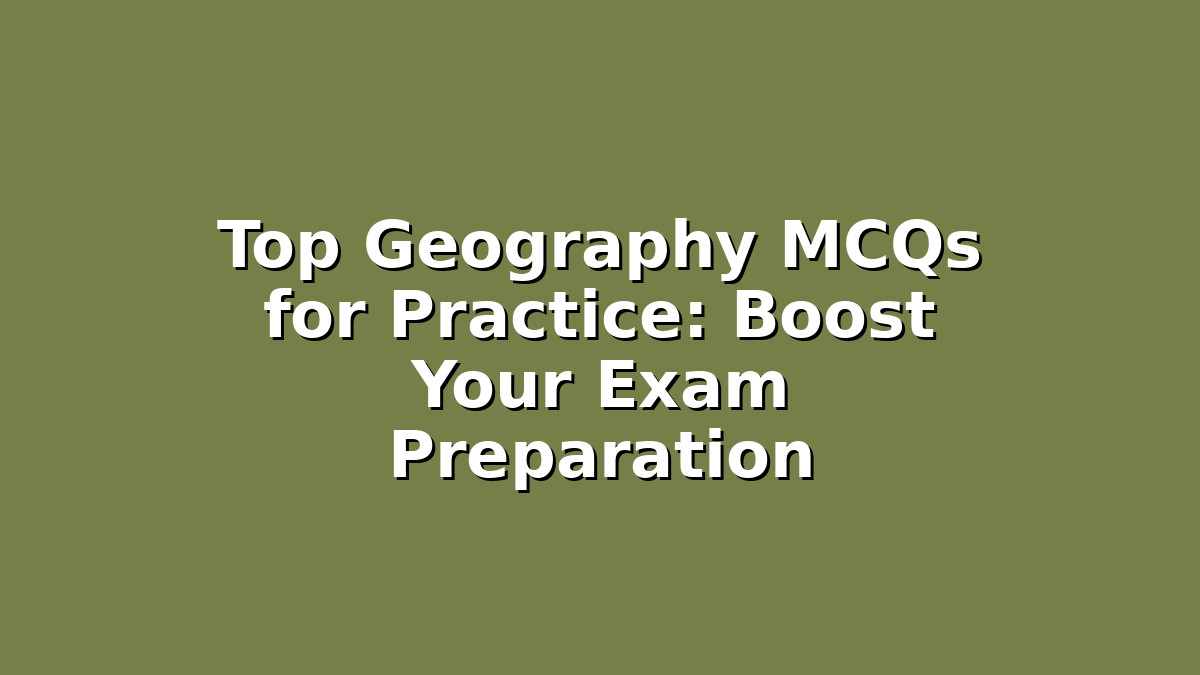Introduction
Geography is a fascinating subject that helps us understand the world around us—from physical landscapes to human societies and environmental processes. For students preparing for exams, mastering geography concepts can be both enjoyable and rewarding. One of the best ways to reinforce your knowledge and improve your exam performance is through practicing Multiple Choice Questions (MCQs). MCQs not only test your comprehension but also sharpen your critical thinking and time management skills.
In this article, we will explore top geography MCQs that every student should practice, along with effective study tips to help you excel. Whether you are preparing for school exams, competitive tests, or simply want to strengthen your geography fundamentals, these strategies and questions will guide you toward success.
Section 1: Why Practice Geography MCQs?
Practice makes perfect, and when it comes to geography, MCQs are especially useful. Here’s why:
– Quick Assessment: MCQs allow you to quickly evaluate how well you understand key geography concepts such as physical features, climate, population, and geopolitics.
– Better Retention: Repeated exposure to questions helps solidify facts and concepts in your memory.
– Exam Simulation: Since many exams use MCQs, practicing them prepares you for the format and timing.
– Identifying Weak Areas: When you practice MCQs, you can easily spot topics you find challenging and focus your revision accordingly.
To maximize your practice, it’s important to approach MCQs strategically. Don’t just memorize answers—try to understand why each answer is correct or incorrect. This deeper insight will boost your confidence and performance on test day.
Section 2: Top Geography MCQs to Practice
Below are some carefully selected geography MCQs designed to cover a range of essential topics. Use these to test yourself or discuss with friends during study sessions.
1. Which is the longest river in the world?
A) Amazon
B) Nile
C) Yangtze
D) Mississippi
Answer: B) Nile
*Tip:* While the Amazon is the largest by volume, the Nile is generally considered the longest river.
2. What type of climate is characterized by hot summers and cold winters?
A) Tropical
B) Mediterranean
C) Continental
D) Polar
Answer: C) Continental
*Tip:* Continental climates are typical of inland areas away from large bodies of water.
3. Which country has the largest population in the world?
A) United States
B) India
C) China
D) Indonesia
Answer: C) China
*Tip:* India is projected to surpass China soon, so stay updated on current statistics.
4. What is the primary cause of earthquakes?
A) Volcanic eruptions
B) Plate tectonics
C) Tsunamis
D) Hurricanes
Answer: B) Plate tectonics
*Tip:* The movement of Earth’s plates causes seismic activity.
5. Which continent is known as the ‘Dark Continent’?
A) Asia
B) Africa
C) Antarctica
D) Australia
Answer: B) Africa
*Tip:* This term originated due to historical lack of knowledge about Africa’s interior.
6. Mount Everest is located in which mountain range?
A) Andes
B) Alps
C) Himalayas
D) Rockies
Answer: C) Himalayas
*Tip:* The Himalayas are home to the world’s tallest peaks.
7. Which of the following is NOT a renewable resource?
A) Solar energy
B) Coal
C) Wind energy
D) Hydropower
Answer: B) Coal
*Tip:* Coal is fossil fuel-based and non-renewable.
8. What is the main factor that influences ocean tides?
A) Wind
B) Moon’s gravity
C) Earthquakes
D) Sun’s heat
Answer: B) Moon’s gravity
*Tip:* The gravitational pull of the moon causes tides.
9. Which country is known as the Land of the Rising Sun?
A) China
B) Japan
C) South Korea
D) Thailand
Answer: B) Japan
*Tip:* This nickname reflects Japan’s eastern location relative to Asia.
10. Which soil type is most fertile for agriculture?
A) Sandy
B) Clayey
C) Loamy
D) Rocky
Answer: C) Loamy
*Tip:* Loamy soil balances sand, silt, and clay, providing good drainage and nutrients.
Feel free to expand this list by exploring topics like world capitals, rivers, climate zones, natural disasters, and environmental conservation. The more diverse your MCQ practice, the better your overall understanding will be.
Section 3: How to Effectively Use MCQs in Your Study Routine
Simply answering MCQs is not enough; you need a systematic approach to make the most of your practice. Here are some study tips:
1. Set a Regular Practice Schedule
Dedicate specific time slots each week to solve geography MCQs. Consistency helps build momentum and reinforces learning.
2. Review Explanations Thoroughly
After attempting MCQs, always read detailed explanations—even for questions you got right. Understanding the reasoning behind answers deepens your knowledge.
3. Use Flashcards for Difficult Concepts
Create flashcards with questions on one side and answers on the other. Use these to revise tricky topics anytime, anywhere.
4. Simulate Exam Conditions
Time yourself while solving a batch of MCQs to get used to exam pressure. This will improve your speed and accuracy.
5. Group Study Sessions
Discussing MCQs with peers can reveal different perspectives and clarify doubts. Teaching others is also a powerful way to learn.
6. Track Your Progress
Maintain a record of your scores and the topics you find challenging. Focus extra effort on weak areas to boost your overall performance.
7. Combine with Other Study Methods
Don’t rely solely on MCQs. Complement your practice with reading textbooks, watching educational videos, and using maps for visual learning.
Conclusion
Preparing for geography exams can be a rewarding journey when you combine enthusiasm with the right strategies. Practicing geography MCQs is one of the most effective ways to enhance your understanding and exam readiness. By regularly testing yourself with well-rounded questions, reviewing answers thoughtfully, and incorporating the study tips outlined above, you can build confidence and achieve excellent results.
Remember, geography is not just about memorizing facts—it’s about connecting with the world’s diverse landscapes, cultures, and environments. Stay curious, stay motivated, and make your study sessions enjoyable. With dedication and smart practice, success in your geography exams is well within your reach!

Responses